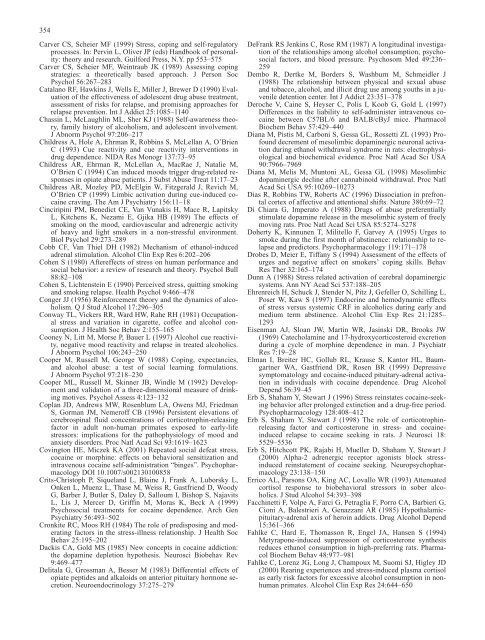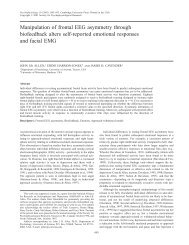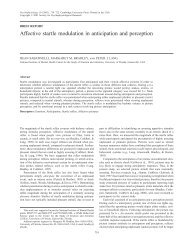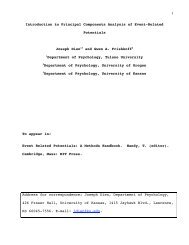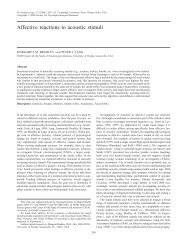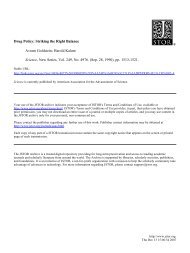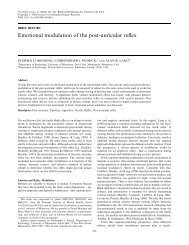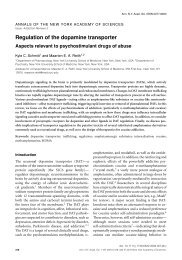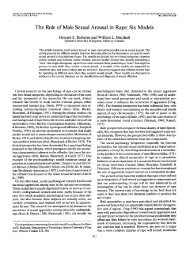How does stress increase risk of drug abuse - Addiction Research ...
How does stress increase risk of drug abuse - Addiction Research ...
How does stress increase risk of drug abuse - Addiction Research ...
Create successful ePaper yourself
Turn your PDF publications into a flip-book with our unique Google optimized e-Paper software.
354<br />
Carver CS, Scheier MF (1999) Stress, coping and self-regulatory<br />
processes. In: Pervin L, Oliver JP (eds) Handbook <strong>of</strong> personality:<br />
theory and research. Guilford Press, N.Y. pp 553–575<br />
Carver CS, Scheier MF, Weintraub JK (1989) Assessing coping<br />
strategies: a theoretically based approach. J Person Soc<br />
Psychol 56:267–283<br />
Catalano RF, Hawkins J, Wells E, Miller J, Brewer D (1990) Evaluation<br />
<strong>of</strong> the effectiveness <strong>of</strong> adolescent <strong>drug</strong> <strong>abuse</strong> treatment,<br />
assessment <strong>of</strong> <strong>risk</strong>s for relapse, and promising approaches for<br />
relapse prevention. Int J Addict 25:1085–1140<br />
Chassin L, McLaughlin ML, Sher KJ (1988) Self-awareness theory,<br />
family history <strong>of</strong> alcoholism, and adolescent involvement.<br />
J Abnorm Psychol 97:206–217<br />
Childress A, Hole A, Ehrman R, Robbins S, McLellan A, O’Brien<br />
C (1993) Cue reactivity and cue reactivity interventions in<br />
<strong>drug</strong> dependence. NIDA Res Monogr 137:73–95<br />
Childress AR, Ehrman R, McLellan A, MacRae J, Natalie M,<br />
O’Brien C (1994) Can induced moods trigger <strong>drug</strong>-related responses<br />
in opiate <strong>abuse</strong> patients. J Subst Abuse Treat 11:17–23<br />
Childress AR, Mozley PD, McElgin W, Fitzgerald J, Revich M,<br />
O’Brien CP (1999) Limbic activation during cue-induced cocaine<br />
craving. The Am J Psychiatry 156:11–18<br />
Cinciripini PM, Benedict CE, Van Vunakis H, Mace R, Lapitsky<br />
L, Kitchens K, Nezami E, Gjika HB (1989) The effects <strong>of</strong><br />
smoking on the mood, cardiovascular and adrenergic activity<br />
<strong>of</strong> heavy and light smokers in a non-<strong>stress</strong>ful environment.<br />
Biol Psychol 29:273–289<br />
Cobb CF, Van Thiel DH (1982) Mechanism <strong>of</strong> ethanol-induced<br />
adrenal stimulation. Alcohol Clin Exp Res 6:202–206<br />
Cohen S (1980) Aftereffects <strong>of</strong> <strong>stress</strong> on human performance and<br />
social behavior: a review <strong>of</strong> research and theory. Psychol Bull<br />
88:82–108<br />
Cohen S, Lichtenstein E (1990) Perceived <strong>stress</strong>, quitting smoking<br />
and smoking relapse. Health Psychol 9:466–478<br />
Conger JJ (1956) Reinforcement theory and the dynamics <strong>of</strong> alcoholism.<br />
Q J Stud Alcohol 17:296–305<br />
Conway TL, Vickers RR, Ward HW, Rahe RH (1981) Occupational<br />
<strong>stress</strong> and variation in cigarette, c<strong>of</strong>fee and alcohol consumption.<br />
J Health Soc Behav 2:155–165<br />
Cooney N, Litt M, Morse P, Bauer L (1997) Alcohol cue reactivity,<br />
negative mood reactivity and relapse in treated alcoholics.<br />
J Abnorm Psychol 106:243–250<br />
Cooper M, Russell M, George W (1988) Coping, expectancies,<br />
and alcohol <strong>abuse</strong>: a test <strong>of</strong> social learning formulations.<br />
J Abnorm Psychol 97:218–230<br />
Cooper ML, Russell M, Skinner JB, Windle M (1992) Development<br />
and validation <strong>of</strong> a three-dimensional measure <strong>of</strong> drinking<br />
motives. Psychol Assess 4:123–132<br />
Coplan JD, Andrews MW, Rosenblum LA, Owens MJ, Friedman<br />
S, Gorman JM, Nemer<strong>of</strong>f CB (1996) Persistent elevations <strong>of</strong><br />
cerebrospinal fluid concentrations <strong>of</strong> corticotrophin-releasing<br />
factor in adult non-human primates exposed to early-life<br />
<strong>stress</strong>ors: implications for the pathophysiology <strong>of</strong> mood and<br />
anxiety disorders. Proc Natl Acad Sci 93:1619–1623<br />
Covington HE, Miczek KA (2001) Repeated social defeat <strong>stress</strong>,<br />
cocaine or morphine: effects on behavioral sensitization and<br />
intravenous cocaine self-administration “binges”. Psychopharmacology<br />
DOI 10.1007/s002130100858<br />
Crits-Christoph P, Siqueland L, Blaine J, Frank A, Luborsky L,<br />
Onken L, Muenz L, Thase M, Weiss R, Gastfriend D, Woody<br />
G, Barber J, Butler S, Daley D, Salloum I, Bishop S, Najavits<br />
L, Lis J, Mercer D, Griffin M, Moras K, Beck A (1999)<br />
Psychosocial treatments for cocaine dependence. Arch Gen<br />
Psychiatry 56:493–502<br />
Cronkite RC, Moos RH (1984) The role <strong>of</strong> predisposing and moderating<br />
factors in the <strong>stress</strong>-illness relationship. J Health Soc<br />
Behav 25:195–202<br />
Dackis CA, Gold MS (1985) New concepts in cocaine addiction:<br />
the dopamine depletion hypothesis. Neurosci Biobehav Rev<br />
9:469–477<br />
Delitala G, Grossman A, Besser M (1983) Differential effects <strong>of</strong><br />
opiate peptides and alkaloids on anterior pituitary hormone secretion.<br />
Neuroendocrinology 37:275–279<br />
DeFrank RS Jenkins C, Rose RM (1987) A longitudinal investigation<br />
<strong>of</strong> the relationships among alcohol consumption, psychosocial<br />
factors, and blood pressure. Psychosom Med 49:236–<br />
259<br />
Dembo R, Dertke M, Borders S, Washburn M, Schmeidler J<br />
(1988) The relationship between physical and sexual <strong>abuse</strong><br />
and tobacco, alcohol, and illicit <strong>drug</strong> use among youths in a juvenile<br />
detention center. Int J Addict 23:351–378<br />
Deroche V, Caine S, Heyser C, Polis I, Koob G, Gold L (1997)<br />
Differences in the liability to self-administer intravenous cocaine<br />
between C57BL/6 and BALB/cByJ mice. Pharmacol<br />
Biochem Behav 57:429–440<br />
Diana M, Pistis M, Carboni S, Gessa GL, Rossetti ZL (1993) Pr<strong>of</strong>ound<br />
decrement <strong>of</strong> mesolimbic dopaminergic neuronal activation<br />
during ethanol withdrawal syndrome in rats: electrophysiological<br />
and biochemical evidence. Proc Natl Acad Sci USA<br />
90:7966–7969<br />
Diana M, Melis M, Muntoni AL, Gessa GL (1998) Mesolimbic<br />
dopaminergic decline after cannabinoid withdrawal. Proc Natl<br />
Acad Sci USA 95:10269–10273<br />
Dias R, Robbins TW, Roberts AC (1996) Dissociation in prefrontal<br />
cortex <strong>of</strong> affective and attentional shifts. Nature 380:69–72<br />
Di Chiara G, Imperato A (1988) Drugs <strong>of</strong> <strong>abuse</strong> preferentially<br />
stimulate dopamine release in the mesolimbic system <strong>of</strong> freely<br />
moving rats. Proc Natl Acad Sci USA 85:5274–5278<br />
Doherty K, Kinnunen T, Militello F, Garvey A (1995) Urges to<br />
smoke during the first month <strong>of</strong> abstinence: relationship to relapse<br />
and predictors. Psychopharmacology 119:171–178<br />
Drobes D, Meier E, Tiffany S (1994) Assessment <strong>of</strong> the effects <strong>of</strong><br />
urges and negative affect on smokers’ coping skills. Behav<br />
Res Ther 32:165–174<br />
Dunn A (1988) Stress related activation <strong>of</strong> cerebral dopaminergic<br />
systems. Ann NY Acad Sci 537:188–205<br />
Ehrenreich H, Schuck J, Stender N, Pitz J, Gefeller O, Schilling L,<br />
Poser W, Kaw S (1997) Endocrine and hemodynamic effects<br />
<strong>of</strong> <strong>stress</strong> versus systemic CRF in alcoholics during early and<br />
medium term abstinence. Alcohol Clin Exp Res 21:1285–<br />
1293<br />
Eisenman AJ, Sloan JW, Martin WR, Jasinski DR, Brooks JW<br />
(1969) Catecholamine and 17-hydroxycorticosteroid excretion<br />
during a cycle <strong>of</strong> morphine dependence in man. J Psychiatr<br />
Res 7:19–28<br />
Elman I, Breiter HC, Gollub RL, Krause S, Kantor HL, Baumgartner<br />
WA, Gastfriend DR, Rosen BR (1999) Depressive<br />
symptomatology and cocaine-induced pituitary-adrenal activation<br />
in individuals with cocaine dependence. Drug Alcohol<br />
Depend 56:39–45<br />
Erb S, Shaham Y, Stewart J (1996) Stress reinstates cocaine-seeking<br />
behavior after prolonged extinction and a <strong>drug</strong>-free period.<br />
Psychopharmacology 128:408–412<br />
Erb S, Shaham Y, Stewart J (1998) The role <strong>of</strong> corticotrophinreleasing<br />
factor and corticosterone in <strong>stress</strong>- and cocaineinduced<br />
relapse to cocaine seeking in rats. J Neurosci 18:<br />
5529–5536<br />
Erb S, Hitchcott PK, Rajabi H, Mueller D, Shaham Y, Stewart J<br />
(2000) Alpha-2 adrenergic receptor agonists block <strong>stress</strong>induced<br />
reinstatement <strong>of</strong> cocaine seeking. Neuropsychopharmacology<br />
23:138–150<br />
Errico AL, Parsons OA, King AC, Lovallo WR (1993) Attenuated<br />
cortisol response to biobehavioral <strong>stress</strong>ors in sober alcoholics.<br />
J Stud Alcohol 54:393–398<br />
Facchinetti F, Volpe A, Farci G, Petraglia F, Porro CA, Barbieri G,<br />
Cioni A, Balestrieri A, Genazzani AR (1985) Hypothalamicpituitary-adrenal<br />
axis <strong>of</strong> heroin addicts. Drug Alcohol Depend<br />
15:361–366<br />
Fahlke C, Hard E, Thomasson R, Engel JA, Hansen S (1994)<br />
Metyrapone-induced suppression <strong>of</strong> corticosterone synthesis<br />
reduces ethanol consumption in high-preferring rats. Pharmacol<br />
Biochem Behav 48:977–981<br />
Fahlke C, Lorenz JG, Long J, Champoux M, Suomi SJ, Higley JD<br />
(2000) Rearing experiences and <strong>stress</strong>-induced plasma cortisol<br />
as early <strong>risk</strong> factors for excessive alcohol consumption in nonhuman<br />
primates. Alcohol Clin Exp Res 24:644–650


